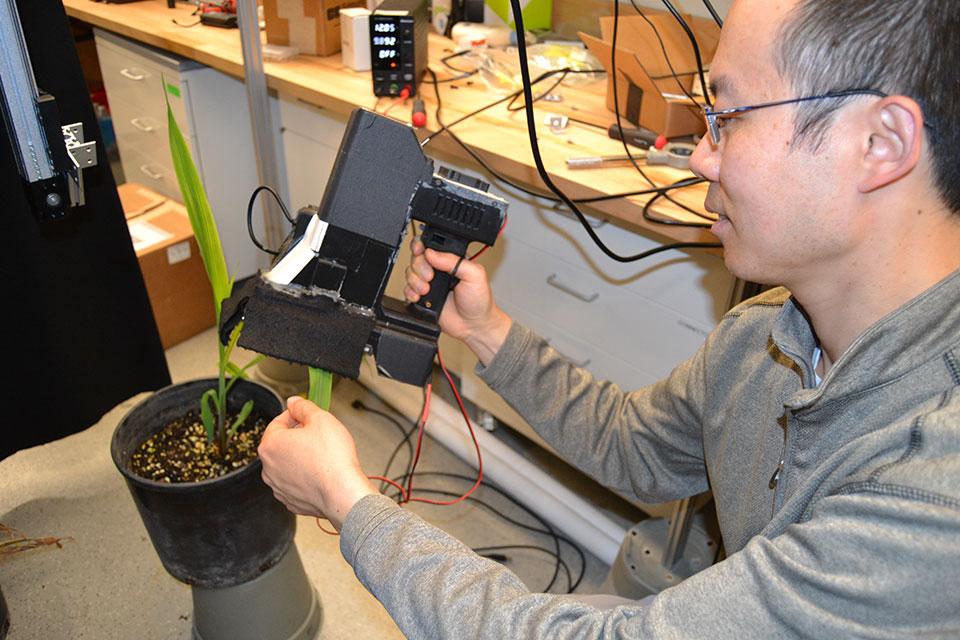Ways Phenotyping Has a Growing Sense for Plant Health

Purdue University Assistant Professor Jian Jin analyzes a corn leaf with the school’s patented LeafSpec tool, the first portable hyperspectral crop leaf imager of its kind, he says. The tool has great potential for plant phenotyping beyond row crops.
Photo by Thomas Skernivitz
Apple growers in New York state may never forget their outbreak of fire blight in 2022. The disease, caused by the bacterium Erwinia amylovora, destroyed entire orchard blocks before many knew what had them.
“Fire blight is one of the many diseases of that type that, when you notice something is going on in your orchard, it’s already too late. There is nothing you can do. You can only wait and watch,” Jian Jin, an Associate Professor of Agricultural and Biological Engineering (ABE) at Purdue University, says.
Thanks to Jin and his colleagues, growers can now do something. Purdue, which boasts the nation’s No. 1 agricultural and biological engineering (ABE) program, manufactures the patented LeafSpec technology from its ABE Plant Sensor Lab, which Jin oversees. The product is billed as the first (and still only) portable hyperspectral crop leaf imager of its kind.
Hand-Held Precision Ag
Plant phenotyping — defined as the process of measuring and analyzing observable plant characteristics — took flight at Purdue in 2013 as part of a new plant science initiative.
Jin, 42, has experienced the benefits of phenotyping from two perspectives during his career. He had grown into the technology while working in the breeding industry for DuPont Pioneer. At Purdue he applies phenotyping to a plant’s leaves rather than its seeds. His goal is to “close the loop” that is precision agriculture.
“No. 1, we have the highest quality. When the noise is down, the quality is higher,” Jin says. “No. 2, this is a real hyperspectral or multispectral sensor, so it can see much more color than human eyes. And No. 3, we are the only sensor of this type with the highest spatial resolution.
“So, we are combining high quality, hyperspectral imaging, and high spatial resolution. If you are looking for such a thing with all three of these and the software with advanced AI together, LeafSpec is probably the only one you can find around the world. And we are proud that we have introduced and innovated that from Purdue.”
Specialty Crops Apply
Based in West Lafayette, IN, Purdue is in the heart of row crop country. Much of the research at the Plant Sensor Lab revolves around corn plants, specifically their leaves. Nonetheless, LeafSpec does cater to fruit and vegetable growers domestically and internationally. One of its customers is Farm2U, a vertical company that provides services to hundreds of apple growers in the Kashmir region of northwest India.
“That’s a world-famous valley for apple production where they used LeafSpec locally to scan the leaves,” Jin says. “They actually sponsored another research project at Purdue for us to help them process their images, and the results showed that, with the LeafSpec images, we were able to identify, yes or no, is there a disease? And if there is any disease, we know which type of disease. That helps farmers a lot.”
U.S. growers are starting to take notice. Jin attracted attention from local fruit growers, vineyardists, and greenhouse vegetable growers while conducting a research seminar at Cornell University’s AgriTech Section in Geneva, NY.
He eventually received an invitation to compete in November as one of 20 finalists in Grow-NY, an annual competition designed to enhance food, beverage, and agricultural innovation in upstate New York. LeafSpec, one of just three Midwest companies in the mix, finished out of the money (top seven) but did earn accolades from the Grow-NY committee.
“Generally, the response I heard in New York,” Jin says, “is that they found the coolest sensor technology from the Midwest.”
Meanwhile, the LeafSpec technology continues to bolster Purdue’s faculty-grower relationships.
“Most U.S. farmers are still relying on the same way their grandparents determined plant health, which is looking at the plants with their own eyes and guessing,” Jin says. “We feel ashamed that we still haven’t helped the farmers to make better decisions. But I’m seeing the light at the end of the tunnel. With more progress, we should be able to change this game and allow farmers to make wiser decisions very soon.”
For more, read the full article as part of our special Global Insight Series report on Plant Health.
In addition, check out the previous reports in Meister’s Global Insight Series covering a range of topics from Biocontrol to Irrigation Innovations to Agricultural Technology.










